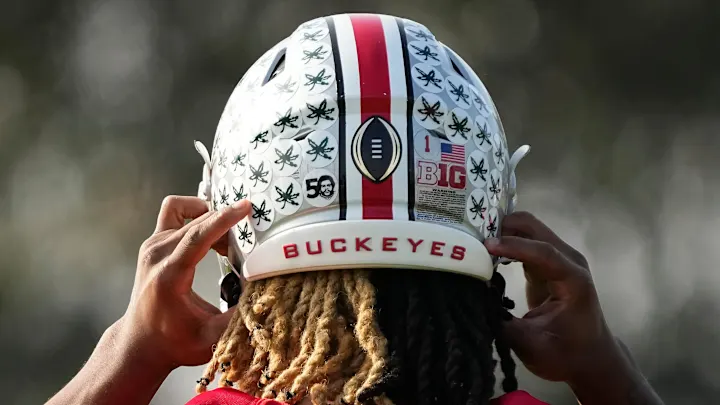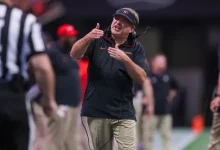An Ohio lawmaker introduced a bill to ban the Ohio State Buckeyes football team from playing noon games against certain opponents.

In a move that has sparked widespread discussion and debate across college football circles, an Ohio state lawmaker has introduced a bill that seeks to prohibit the Ohio State Buckeyes football team from playing noon kickoff games against specific opponents. The proposal, which has quickly gained attention among fans, sports analysts, and university officials, highlights ongoing tensions about competitive balance, fan engagement, and the commercialization of college sports.
This article explores the background behind the bill, the lawmaker’s motivations, the reactions from various stakeholders, and the potential consequences for Ohio State football and college football at large.
The proposed legislation, introduced by State Representative Michael Donahue, aims to ban the Ohio State University football team from scheduling noon kickoff games against certain teams deemed as “high-profile rivals or marquee matchups.” While the bill’s language specifically mentions traditional rivals such as Michigan and Penn State, it broadly covers any games that might draw large television audiences or significant statewide attention.
According to the bill’s text, the rationale for this restriction is to prevent the Buckeyes from playing at noon when such games could disrupt local traditions, community events, or broader fan engagement opportunities. The bill argues that later kickoff times, such as afternoon or evening slots, would better serve Ohio fans and the state’s economy.
Representative Donahue stated in a public release, “Our Buckeyes are a source of pride for Ohioans, and we want to make sure that the timing of these games maximizes fan involvement, benefits local businesses, and respects the culture of our communities.”
Noon kickoff games have long been a staple in college football, especially at Ohio State. Historically, many Ohio State home games have been played at noon, allowing families and fans to gather early in the day and creating a vibrant game day atmosphere in Columbus and across the state.
The tradition of noon games also ties into broadcast scheduling, with networks often slotting prominent Big Ten matchups at midday to maximize viewership across multiple time zones.
However, as college football has evolved—with expanded television contracts, prime-time scheduling, and ever-increasing media attention—the timing of games has become a strategic element for schools, conferences, and networks aiming to optimize exposure and revenue.
Representative Donahue’s bill appears to be motivated by several factors:
- Fan Experience: Donahue argues that later games, especially those in the afternoon or evening, allow more fans to participate fully in the game day experience, including tailgating, pre-game events, and local festivities that extend into the evening. Noon games, he contends, can sometimes limit these experiences, especially for fans who travel long distances or have daytime obligations.
- Economic Impact: Columbus businesses—restaurants, bars, hotels, and retail—benefit greatly from football weekends. Donahue suggests that shifting high-profile games to later time slots could boost local economies by extending the hours fans spend in the city.
- Broadcast and Revenue Considerations: While not explicitly stated, there is an underlying recognition that television networks and the Big Ten Conference often influence game times for optimal ratings. Donahue’s bill can be interpreted as an attempt to assert more local control over scheduling decisions, pushing back against national broadcast priorities that might not always align with Ohio fan preferences.
- Community and Cultural Concerns: Some community members and fan groups have expressed concerns that noon games conflict with family events, religious services, or other local traditions. The bill aims to address these concerns by mandating game times that better fit community rhythms.
The Ohio State University athletic department has responded cautiously to the news of the proposed legislation. A spokesperson for Ohio State Athletics said, “We respect the legislative process and appreciate the passion Ohioans have for Buckeye football. Game scheduling involves many factors including competitive fairness, television contracts, and fan experience. We will continue to work closely with all stakeholders to find the best solutions.”
Head coach Ryan Day, when asked about the bill at a press conference, focused on the team’s priorities.
“Our focus is always on preparing our players and competing at the highest level,” Day said. “Scheduling decisions are made by the university and conference officials. We trust their judgment and will continue to support the Buckeye Nation in every game, regardless of kickoff time.”
The reaction among fans and alumni has been mixed, reflecting differing perspectives on tradition, convenience, and competitive strategy.
- Supporters of the Bill: Some fans agree with the lawmaker’s viewpoint, citing personal experiences with noon games conflicting with work schedules or family plans. They argue that later game times enhance tailgating, increase attendance at pre-game events, and generate greater enthusiasm overall.
- Opponents of the Bill: Many Buckeye faithful see the bill as an unnecessary interference in the university’s autonomy and the Big Ten’s scheduling process. They value the tradition of noon games and believe such restrictions could complicate scheduling and limit flexibility. Some also express concern about political overreach into sports programming.
Social media platforms have been rife with debate, with hashtags like #KeepTheNoonKickoff trending among those defending the status quo, while others promote #LaterForBuckeyes to advocate for change.
Scheduling in college football is a complex process involving conferences, television networks, and individual programs. The Big Ten Conference, which governs Ohio State’s football scheduling, plays a key role in coordinating game times to maximize competitive fairness and broadcast ratings.
A Big Ten representative declined to comment on the specific bill but noted, “We work closely with our member institutions and broadcast partners to schedule games at times that serve fans, student-athletes, and the broader college football community. Our priority is maintaining the integrity of competition while delivering exciting football to viewers across the country.”
Broadcast networks such as ESPN and Fox, which hold significant rights to Big Ten games, have also expressed interest in maintaining scheduling flexibility. Noon games traditionally perform well in terms of viewership, especially for marquee matchups, and networks aim to balance national and regional interests.
If passed, the bill could face legal scrutiny regarding the extent to which a state government can regulate a public university’s sports scheduling or interfere with conference and media contracts.
Critics argue that such legislation might violate contractual agreements or infringe upon institutional autonomy.
Moreover, the practical implementation could be complex. How would the law define “certain opponents”? How would exceptions be handled? Would there be penalties for noncompliance?
University legal counsel and the state’s attorney general would likely be involved in interpreting the bill’s scope and enforceability.
Ohio State is one of the highest-profile programs in college football. Should the bill become law, it could set a precedent for other states or universities considering similar interventions in game scheduling.
The interplay between local government interests, university athletics, and national broadcasting rights is a delicate balance. This bill shines a light on the ongoing debate over who should control when and how college football games are played.
Sports law experts suggest the legislation could ignite broader conversations about the commercialization of college sports and the role of public institutions in managing athletic programs.
Players, while often shielded from administrative decisions, have occasionally shared preferences about game times based on preparation routines and fan energy.
A few Ohio State players have hinted in interviews that later games can create an electric atmosphere with prime-time crowds, while others appreciate the tradition and energy of noon games.
Balancing player well-being, performance optimization, and fan experience is an ongoing conversation within athletic departments.
The bill is currently in committee and faces several rounds of debate before it could reach the governor’s desk for signature.
Stakeholders including Ohio State University, the Big Ten Conference, broadcasters, and fan organizations are likely to lobby intensively for or against the legislation.
In the meantime, Ohio State’s football schedule for upcoming seasons remains unchanged, with noon games slated as usual.
Fans, analysts, and policymakers will be watching closely to see how this unusual intersection of sports, politics, and community interests unfolds.
The introduction of a bill to ban Ohio State from playing noon games against certain opponents is a bold and unprecedented move in the world of college football. It reflects deeper conversations about tradition, fan experience, economic impact, and institutional autonomy.
While the proposal seeks to enhance local fan engagement and community benefits, it also raises complex questions about governance, contracts, and the future of college sports scheduling.
As the Buckeyes prepare for another competitive season, this legislative battle adds a new layer of intrigue to one of college football’s most storied programs.
Whether the bill passes or not, it has already sparked a meaningful dialogue about how college football fits into the broader social and cultural fabric of Ohio and the nation.








